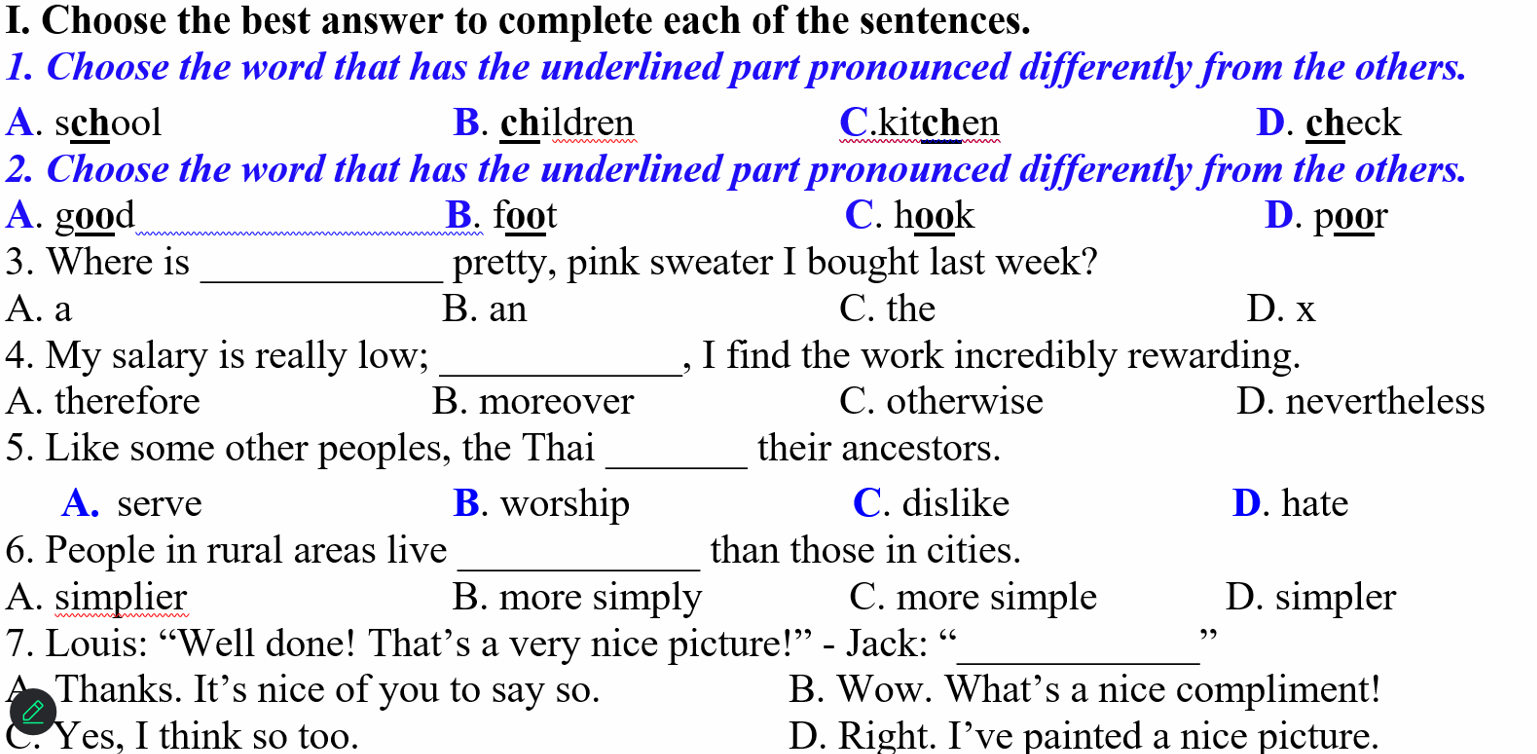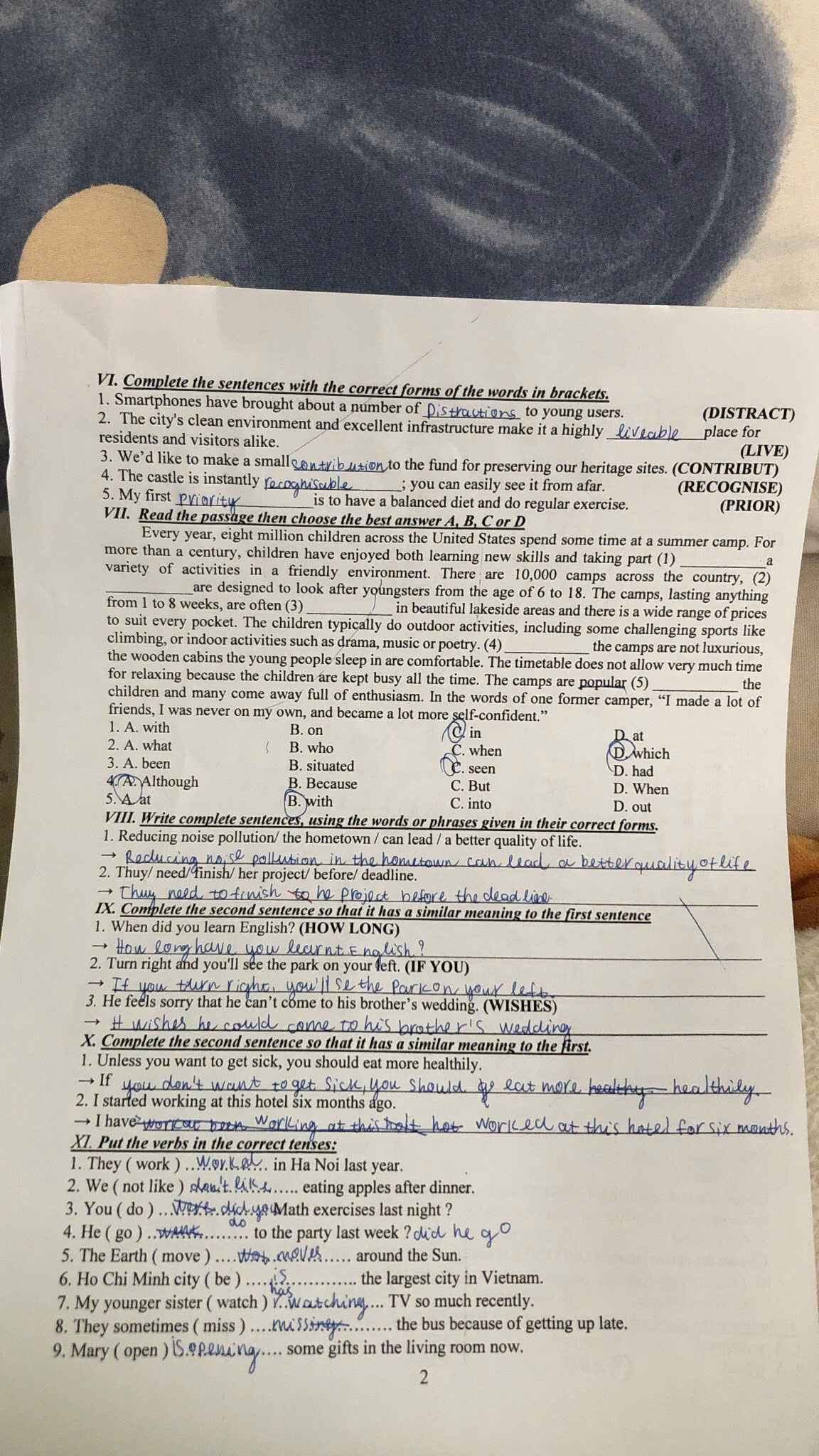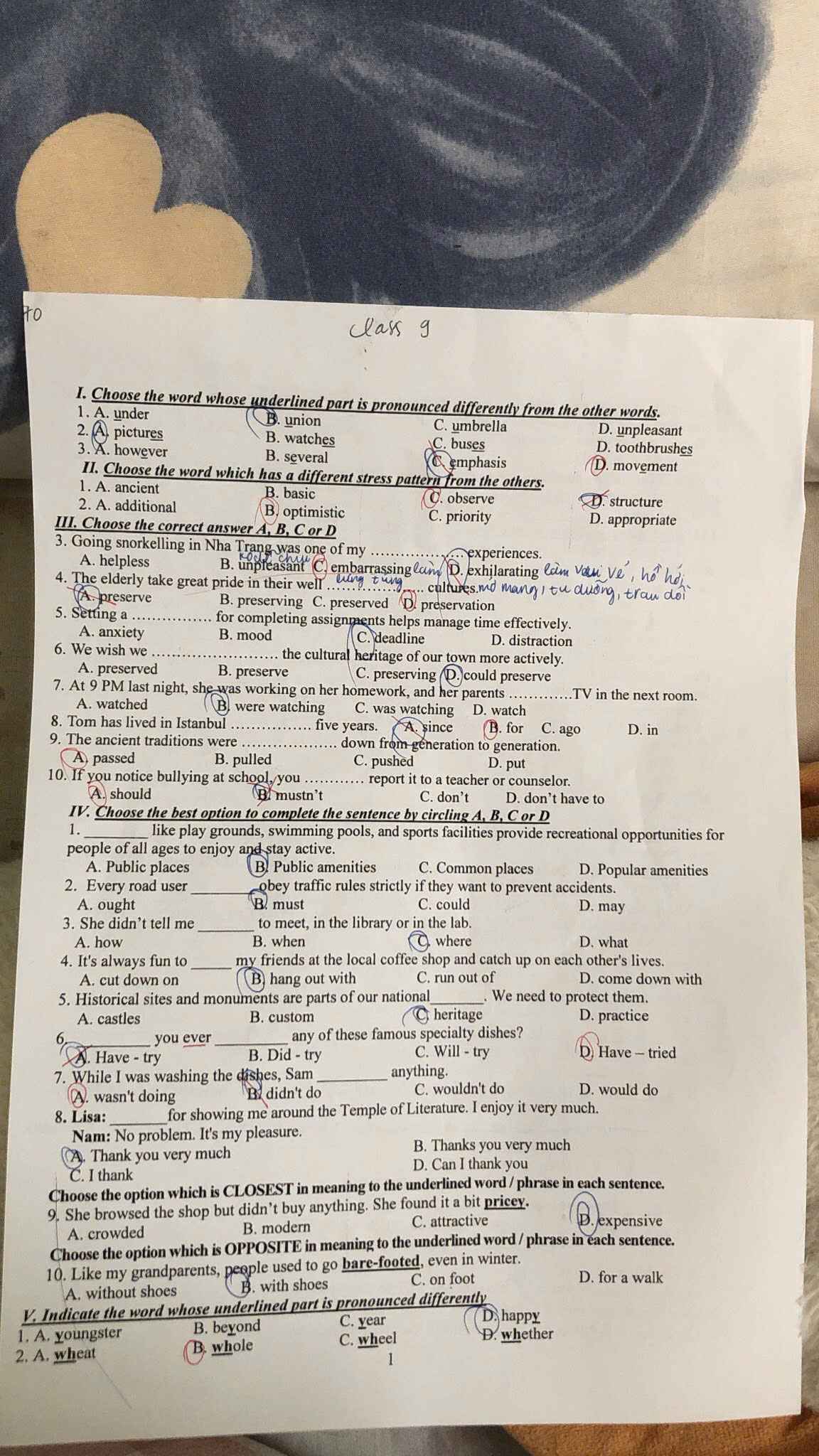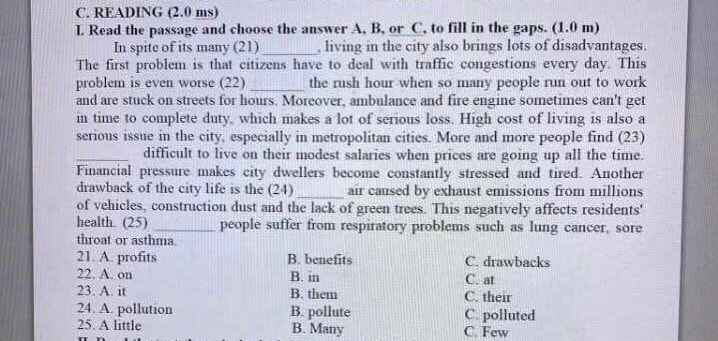 cứu tui với
cứu tui với
Tiếng anh
21. B. benefits
Cấu trúc in spite of : mặc dù thể hiện sự nhượng bộ tương phản giữa 2 mệnh đề.
Dịch: Mặc dù có nhiều lợi ích, việc sống ở thành phố cũng mang lại nhiều bất lợi.
22. B. in
in the rush hour: vào giờ cao điểm
23. A. it
Cấu trúc Find + it + Adj + to do something: diễn tả ai đó nhận thấy như thế nào khi làm việc gì đó.
Dịch: Ngày càng nhiều người cảm thấy khó khăn để sống dựa vào mức lương khiêm tốn của họ khi giá cả luôn tăng cao.
24. C. polluted
Kiến thức từ loại: Đứng trước danh từ là tính từ
Dịch: Một nhược điểm khác của cuộc sống đô thị là không khí ô nhiễm gây ra bởi khí thải từ hàng triệu phương tiện giao thông, bụi từ công trường xây dựng và sự thiếu vắng cây xanh.
25. B. Many
Chọn many: nhiều thay vì little/few: ít dựa vào nghĩa.
Dịch: Nhiều người phải chịu đựng các vấn đề về hô hấp như ung thư phổi, đau họng hoặc hen suyễn.
Đúng 0
Bình luận (0)
Part 1. For questions 1 – 5, read the passage below. Use the word given in capitals at the end of some of the lines to form a word that fits in the gap in the same line. The word ‘security’ has both positive and negative connotations. Most of us would say that we crave security for all its positive virtues, both physical and psychological – its (1. EVOKE) _______________ of the safety of home, of undying love, or freedom from need. More negatively, the word nowadays conjures up images of...
Đọc tiếp
Part 1. For questions 1 – 5, read the passage below. Use the word given in capitals at the end of some of the lines to form a word that fits in the gap in the same line.
The word ‘security’ has both positive and negative connotations. Most of us would say that we crave security for all its positive virtues, both physical and psychological – its (1. EVOKE) _______________ of the safety of home, of undying love, or freedom from need. More negatively, the word nowadays conjures up images of that huge industry which has developed to protect individuals and property from invasion by ‘outsiders’, ostensibly malicious and intent on theft or (2. WILL) _______________ damage.
Increasingly, because they are situated in urban areas of escalating crime, those buildings which used to allow free access to employees and other users (buildings such as offices, schools, colleges, or hospitals) now do not. (3. ENTER) _______________ areas which in another age were called ‘Reception’ are now manned by security staff. Receptionists, whose task was to receive visitors and to make them welcome before passing them on to the person they had come to see, have been supplanted by those whose task is to bar access to the (4. AUTHORITY) _______________ , the unwanted, or the plain unappealing. Inside, these buildings are divided into ‘secure zones’ which often have all the (5. TRAP) _______________ of combination locks and burglar alarms.
vị trí địa lí, địa hình, sông ngòi, khoáng sản, khí hậu, cảnh quan của Đông Á và Đông Nam Á
1. Vị trí địa lý
+Đông Á: Nằm ở phía Đông lục địa Á-Âu, gần biển Thái Bình Dương.
+Đông Nam Á: Nằm giữa Ấn Độ Dương và Thái Bình Dương, giữa lục địa và các quần đảo.
2. Địa hình
+Đông Á: Gồm núi cao, đồng bằng rộng lớn và cao nguyên.
+Đông Nam Á: Chủ yếu là đồi núi, cao nguyên, và nhiều quần đảo.
3. Sông ngòi
+Đông Á: Có nhiều sông lớn, chủ yếu chảy qua các đồng bằng.
+Đông Nam Á: Có các sông lớn chảy qua đồng bằng và khu vực ven biển.
4. Khoáng sản
+Đông Á: Phong phú về khoáng sản như than, kim loại, và quặng quý.
+Đông Nam Á: Có dầu mỏ, khí tự nhiên, và các khoáng sản như vàng, thiếc.
5. Khí hậu
+Đông Á: Khí hậu từ ôn đới đến nhiệt đới, có mùa đông lạnh và mùa hè nóng.
+Đông Nam Á: Khí hậu nhiệt đới gió mùa, nóng ẩm quanh năm.
6. Cảnh quan
+Đông Á: Có núi, đồng bằng, và bờ biển.
+Đông Nam Á: Rừng nhiệt đới, bãi biển, và các quần đảo.
Đúng 0
Bình luận (0)
Đông Á
Vị trí địa lý: Đông Á bao gồm các quốc gia như Trung Quốc, Nhật Bản, Hàn Quốc, Triều Tiên và Mông Cổ. Khu vực này tiếp giáp với biển Đông Trung Quốc, biển Hoàng Hải và biển Nhật Bản.
Địa hình: Đông Á có địa hình phong phú với núi cao, đồng bằng và sa mạc. Dãy núi Himalaya và cao nguyên Tây Tạng ở phía tây Trung Quốc là những nơi có địa hình cao nhất thế giới. Nhật Bản và Hàn Quốc chủ yếu có địa hình đồi núi.
Sông ngòi: Sông Dương Tử và Hoàng Hà ở Trung Quốc là hai trong những sông lớn nhất thế giới. Nhật Bản có nhiều sông ngắn nhưng nước chảy xiết.
Khoáng sản: Trung Quốc có nhiều khoáng sản quan trọng như than đá, sắt, đồng, vàng và dầu mỏ. Nhật Bản và Hàn Quốc phụ thuộc nhiều vào nhập khẩu khoáng sản.
Khí hậu: Khí hậu Đông Á rất đa dạng, từ nhiệt đới gió mùa ở phía nam Trung Quốc đến khí hậu lạnh ở Mông Cổ và vùng núi cao. Nhật Bản có khí hậu ôn đới với bốn mùa rõ rệt.
Cảnh quan: Đông Á nổi tiếng với các cảnh quan thiên nhiên tuyệt đẹp như Vạn Lý Trường Thành, núi Phú Sĩ, và các công viên quốc gia ở Trung Quốc và Nhật Bản.
Đông Nam ÁVị trí địa lý: Đông Nam Á bao gồm các quốc gia như Việt Nam, Thái Lan, Malaysia, Singapore, Indonesia, Philippines, Myanmar, Lào, Campuchia, và Brunei. Khu vực này nằm ở giao điểm của biển Đông, biển Andaman và vịnh Thái Lan.
Địa hình: Đông Nam Á có địa hình đa dạng với núi, đồng bằng ven biển và rừng nhiệt đới, Dãy Trường Sơn ở Việt Nam và dãy núi Tenasserim ở Myanmar là các dãy núi chính.
Sông ngòi: Sông Mekong là dòng sông lớn nhất Đông Nam Á, chảy qua nhiều quốc gia và đóng vai trò quan trọng trong đời sống của người dân. Sông Chao Phraya ở Thái Lan và sông Irrawaddy ở Myanmar cũng là các sông lớn.
Khoáng sản: Indonesia và Malaysia có nhiều khoáng sản quan trọng như dầu mỏ, khí đốt, và thiếc. Việt Nam và Lào có nguồn khoáng sản phong phú bao gồm bauxite, vàng và kim loại khác.
Khí hậu: Đông Nam Á chủ yếu có khí hậu nhiệt đới gió mùa với mùa mưa và mùa khô rõ rệt, Khu vực này cũng chịu ảnh hưởng của bão nhiệt đới, đặc biệt là Philippines và Việt Nam.
Cảnh quan: Đông Nam Á nổi tiếng với các bãi biển đẹp, rừng nhiệt đới, và các di sản văn hóa như ở Campuchia, vịnh Hạ Long ở Việt Nam và đền ở Indonesia.
Đúng 0
Bình luận (0)
1.A. school
2.D. poor
3.C. the
4.D. nevertheless
5.B. worship
6.B. more simply
7.A. Thanks. It’s nice of you to say so. (chắc làm đúng)
Đúng 0
Bình luận (0)
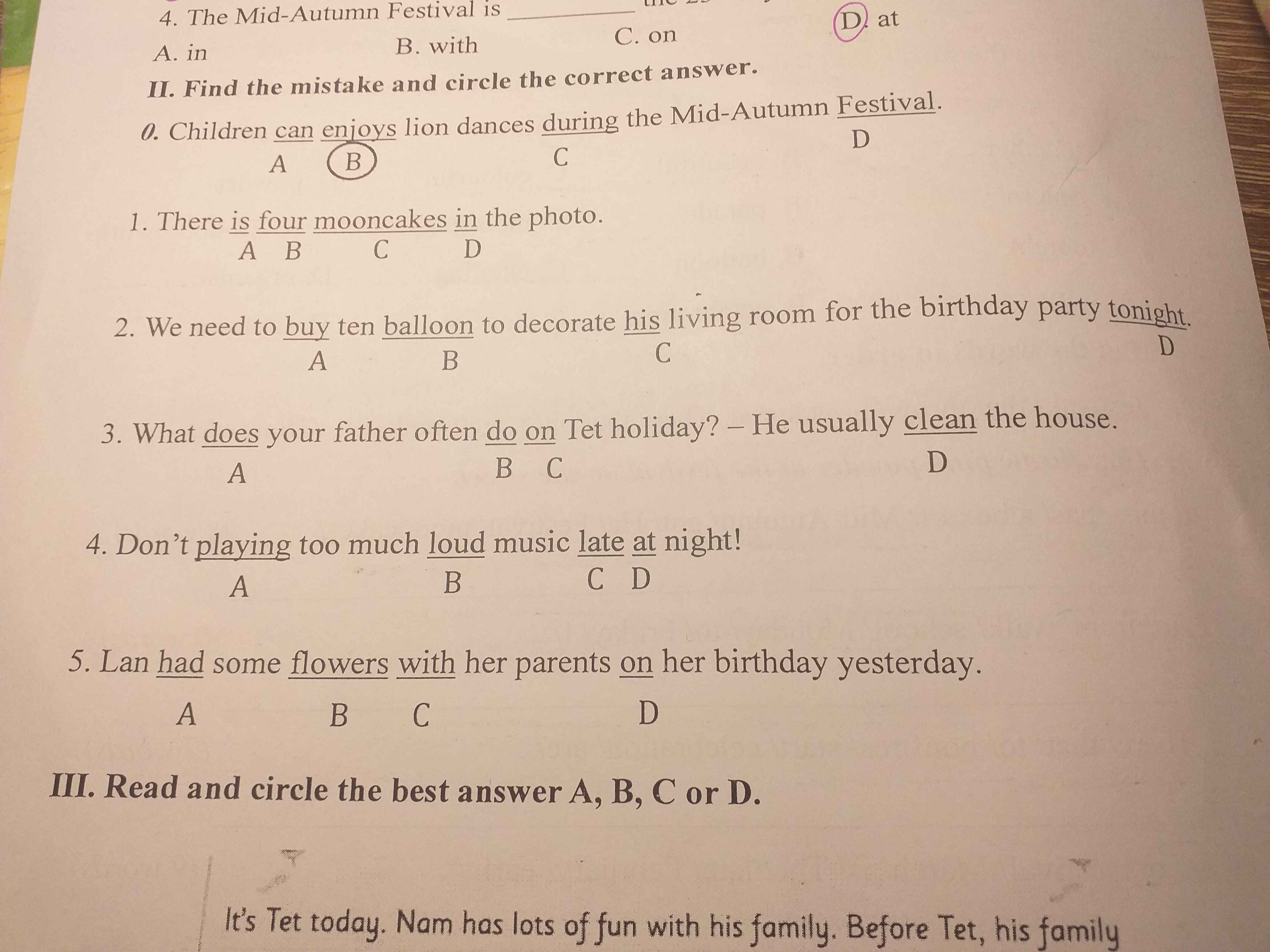 help me
help me
`#3107.101107`
`1.` A
is `->` are
`2.` B
balloon `->` balloons
`3.` D
clean `->` cleans
`4.` A
play `->` playing
`5.` Sr bạn, câu này tớ ch nghĩ ra =))) mong b thông cảm
Đúng 0
Bình luận (0)
1. Chuyển từ câu chủ động sang bị động
Xem chi tiết
Bài tập:
People speak English all over the world.My mother bought me a new dress yesterday.They will build a new bridge next year.1.People speak English all over the world.
→ English is spoken all over the world.
2.My mother bought me a new dress yesterday.
→ I was bought a new dress by my mother yesterday.
3.They will build a new bridge next year.
→ A new bridge will be built next year.
Đúng 2
Bình luận (1)
1.English is spoken all over the world.2.A new dress was bought for me by my mother yesterday.3.A new bridge will be built next year.
Đúng 1
Bình luận (1)
1. Vocabulary and Grammar (Từ vựng và Ngữ pháp)Exercise 1: Fill in the blanks with the correct form of the verbs in brackets.She usually _______ (go) to school by bus, but today she _______ (walk).If I _______ (be) you, I _______ (not buy) that expensive bag.They _______ (study) English for three years now.Exercise 2: Choose the correct word to complete the sentence.My best friend is _______ (friendly/ friendlier) than my sister.We should _______ (reduce/ recycle) plastic waste to protect the en...
Đọc tiếp
1. Vocabulary and Grammar (Từ vựng và Ngữ pháp)Exercise 1: Fill in the blanks with the correct form of the verbs in brackets.She usually _______ (go) to school by bus, but today she _______ (walk).If I _______ (be) you, I _______ (not buy) that expensive bag.They _______ (study) English for three years now.Exercise 2: Choose the correct word to complete the sentence.My best friend is _______ (friendly/ friendlier) than my sister.We should _______ (reduce/ recycle) plastic waste to protect the environment.The movie was so _______ (exciting/ excited) that we watched it twice.2. Reading Comprehension (Đọc hiểu)Exercise 3: Read the passage and answer the questions.
➡ They have _______.“I will help you with your homework,” said John.
➡ John said _______.
Passage:
Anna is a high school student. Every day, she wakes up at 6 a.m., has breakfast, and goes to school. Her favorite subject is English because she wants to become a tour guide in the future. After school, Anna does her homework and helps her mother with housework.
Questions:
What time does Anna wake up?What is Anna's favorite subject?Why does Anna like English?3. Writing (Viết)Exercise 4: Rewrite the sentences without changing their meaning.They started learning English three years ago.➡ They have _______.“I will help you with your homework,” said John.
➡ John said _______.
1. Vocabulary and Grammar
Exercise 1: Fill in the blanks with the correct form of the verbs in brackets.
-She usually goes (go) to school by bus, but today she is walking (walk).
-If I were (be) you, I would not buy (not buy) that expensive bag.
-They have been studying (study) English for three years now.
Exercise 2: Choose the correct word to complete the sentence.
-My best friend is friendlier (friendlier) than my sister.
-We should recycle (recycle) plastic waste to protect the environment.
-The movie was so exciting (exciting) that we watched it twice.
2. Reading Comprehension
Exercise 3: Read the passage and answer the questions.
Passage:
Anna is a high school student. Every day, she wakes up at 6 a.m., has breakfast, and goes to school. Her favorite subject is English because she wants to become a tour guide in the future. After school, Anna does her homework and helps her mother with housework.
Questions:
What time does Anna wake up?
→ Anna wakes up at 6 a.m.
What is Anna's favorite subject?
→ Anna's favorite subject is English.
Why does Anna like English?
→ Anna likes English because she wants to become a tour guide in the future.
3. Writing
Exercise 4: Rewrite the sentences without changing their meaning.
They started learning English three years ago.
→ They have been learning English for three years.
“I will help you with your homework,” said John.
→ John said he would help me with my homework.
Đúng 0
Bình luận (0)
CHUYỂN SANG CÂU BỊ ĐỘNG1. The children had to pick up all the litter. The teacher made them do it- The children2.They made her cry-She3.The refugees cant get a job. The goverment wont let them- The refugees4.Two young men were fighting . We saw them-Two young men5.He discovered that this cotton was grown in Egypt6.They promise that the performance will start on time7.He remommends that we should stay at the city center8.We belived that Alice would pass the driving test9.The director notifies all...
Đọc tiếp
CHUYỂN SANG CÂU BỊ ĐỘNG
1. The children had to pick up all the litter. The teacher made them do it
-> The children
2.They made her cry
->She
3.The refugees can't get a job. The goverment won't let them
-> The refugees
4.Two young men were fighting . We saw them
->Two young men
5.He discovered that this cotton was grown in Egypt
6.They promise that the performance will start on time
7.He remommends that we should stay at the city center
8.We belived that Alice would pass the driving test
9.The director notifies all the workers that they will have to work extra hard this month
10. They have persuaded me that they will go with me to the stadium
.......... is this pencil? - that's mai. (help me)
mọi người ơi giúp em với ạ, xem dùm em sai chỗ nào ạ, mai em thi rồi ạ
Đúng 1
Bình luận (1)
I. Choose the word whose underlined part is pronounced differently
1. B. union
2. D. toothbrushes
II. Choose the word which has a different stress pattern
1.C. observe
2. D. structure
III. Choose the correct answer
3. C. exhilarating
4. B. preserving
5. C. deadline
6.D. preserve
7. C. was watching
8. A. for
9. :A. passed
10. A. should
IV. Choose the best option
1. B. Public amenities
2. A. ought
3. D. what
4. B. hang out with
5.C. heritage
6. A. Have - try
7. A. wasn't doing
8. A. Thank you very much
Choose the option closest in meaning
1. D. expensive
Choose the option opposite in meaning
2. B. with shoes
V. Indicate the word whose underlined part is pronounced differently
1. B. beyond
2. B. whole
VI. Complete the sentences
1. Distractions
2. Livable
3. Contribution
4. Recognizable
5. Priority
VII. Read the passage
1. C. in
2. A. what
3. B. situated
4. C. But
VIII. Write complete sentences
1. Reducing noise pollution in the hometown can lead to a better quality of life
2. Thuy needs to finish her project before the deadline
IX. Complete the second sentence
1. How long have you been learning English?
2. If you turn right, you'll see the park on your left
3. He wishes he could come to his brother's wedding.
XI. Put the verbs in the correct tenses
1. Worked
2. Don't like
3. Did you do
4. Did he go
5. Moves
6. Is
7. Watches
8. Miss
9. Is opening
Đúng 0
Bình luận (0)





